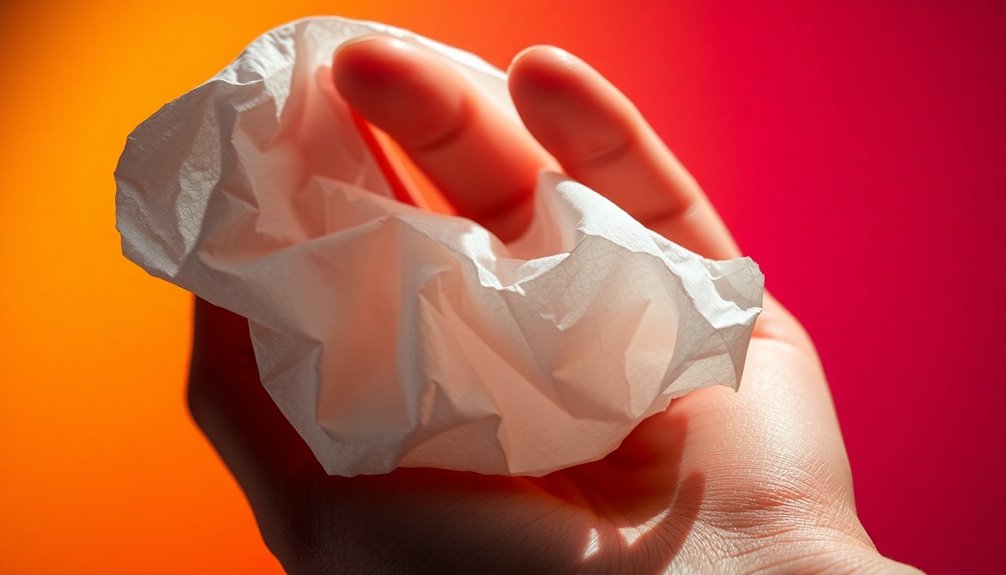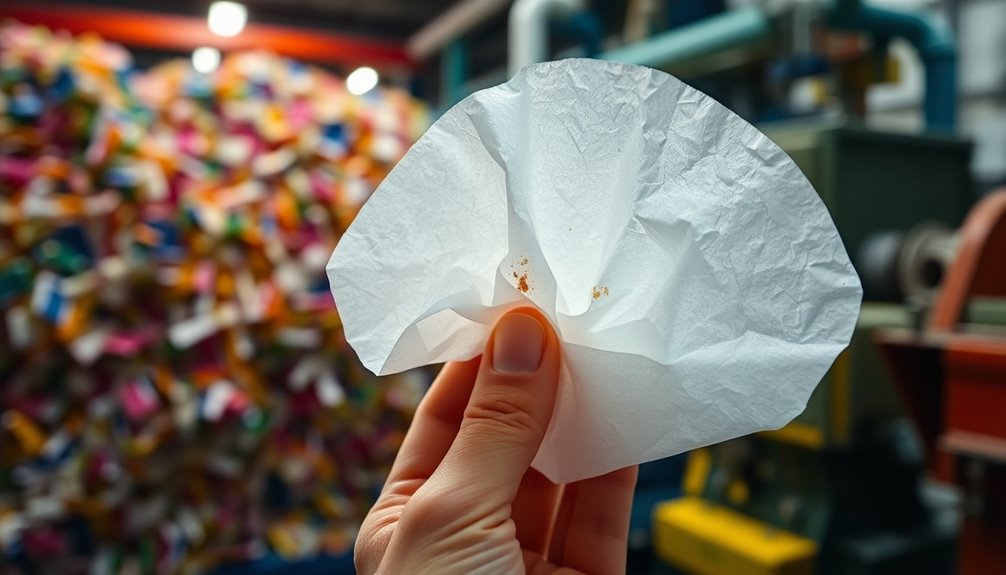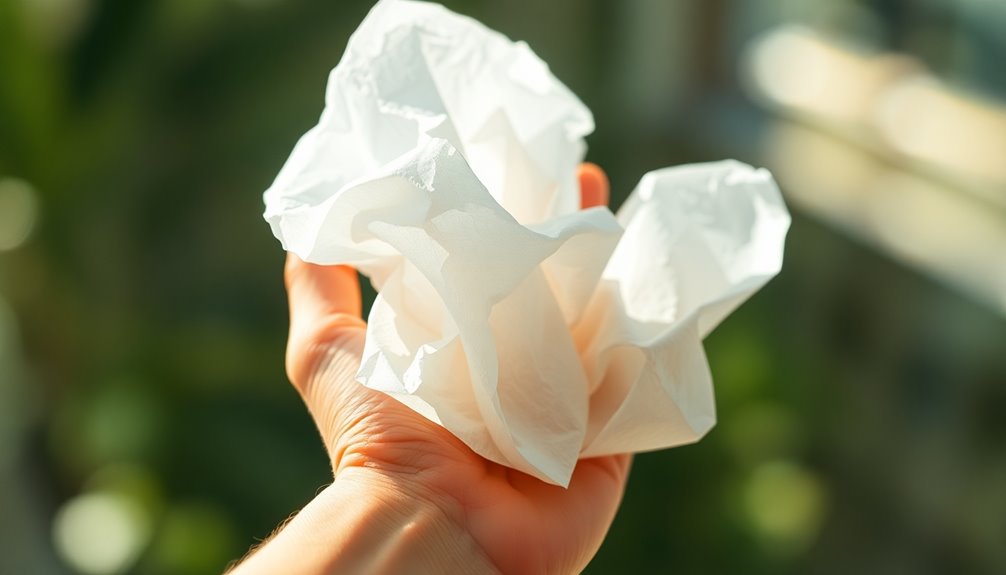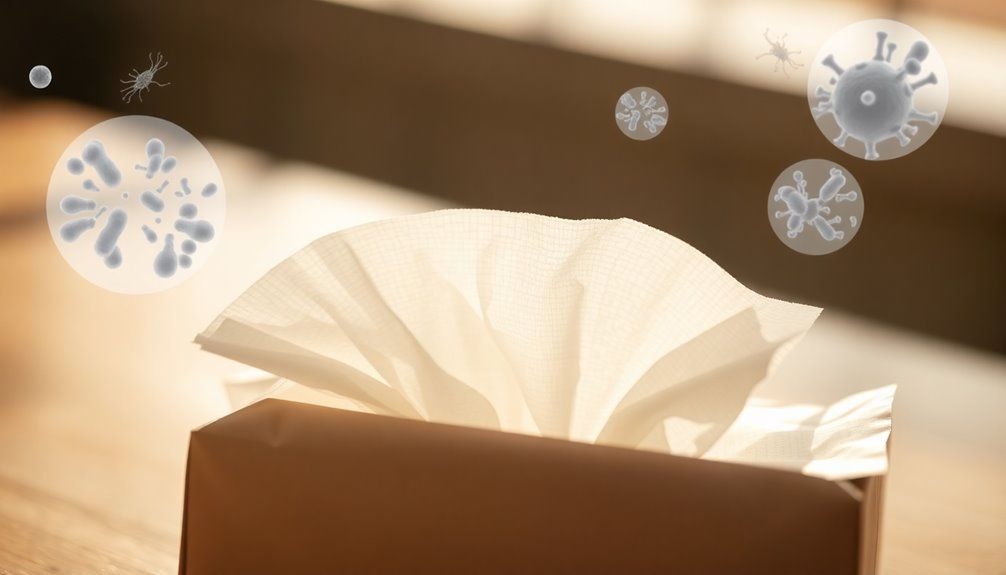Your everyday paper tissues might have hidden dangers, especially if they're made from recycled materials. Many contain harmful chemicals like BPA, linked to serious health issues. The recycling process can leave toxic residues from inks and dyes, potentially impacting your health and indoor air quality. Choosing unbleached, sustainable options can reduce these risks and benefit the environment. Consumer awareness is crucial; understanding product origins helps you make safer choices. It's important to stay informed about what you're using daily, as there's much more to uncover about the products you rely on.
Key Takeaways
- Recycled paper tissues may contain harmful chemicals like bisphenol A (BPA), linked to serious health risks such as cancer and metabolic disorders.
- Toxic inks and additives in recycled tissues can contribute to indoor air pollution, affecting overall air quality and potentially leading to chronic health issues.
- The recycling process can introduce residual toxins, raising safety concerns about the quality of recycled paper products used for personal hygiene.
- Unbleached and sustainable paper options reduce exposure to harmful chemicals and have a lower environmental impact compared to bleached alternatives.
- Consumer awareness is crucial; many popular brands contain hidden dangers, emphasizing the need for transparency in product labeling and manufacturing practices.
Recycled Fibers, Hidden Chemicals

When you reach for that roll of recycled toilet paper, you might not realize the hidden dangers lurking within. Many brands tout their products as eco-friendly, but the truth is that recycled fibers can contain harmful chemicals, particularly bisphenol A (BPA). This endocrine disruptor is linked to serious health risks like cancer and metabolic disorders. The presence of BPA in recycled fibers usually stems from thermal printer paper and newspaper ink included during the recycling process. Additionally, the energy consumption of manufacturing recycled paper products can also contribute to environmental concerns. Studies indicate that toxic substances can accumulate in recycled materials, further exacerbating these health risks. Furthermore, choosing products with high-quality ingredients can help reduce exposure to harmful chemicals in various consumer goods.
While it's great to support sustainability, you need to consider the potential health risks that come with it. Studies show that higher urinary BPA levels correlate with increased risks of metabolic disorders in adults. This raises an important question: Is the ecological benefit of recycled toilet paper worth the potential exposure to harmful chemicals?
To minimize these risks, it's wise to look for brands that prioritize chemical-free, sustainable options. By choosing products specifically designed to reduce harmful substances, you can protect both your health and the environment. Additionally, exploring state-specific retirement benefits can help you make informed financial decisions as you navigate the complexities of sustainable living. So next time you're shopping, remember to check labels and make informed choices about the recycled fibers you bring into your home.
Recycled Paper Processing Methods

Recycled paper processing methods play a crucial role in determining the safety and quality of the final product you use. When manufacturers break down used paper products, they sometimes encounter harmful inks and chemicals that can contaminate recycled paper. The deinking process, which often relies on harsh chemicals, raises concerns about residual toxicity. Even after processing, these chemicals may not be completely removed, posing potential health risks.
Additionally, some recycled toilet papers might contain BPA from sources like thermal printer paper and newspaper ink. BPA is known to act as an endocrine disruptor, which can lead to various health issues. The quality of recycled paper can vary significantly, depending on the source materials and the methods used in processing. This inconsistency can impact both environmental safety and your health as a consumer.
While sustainable recycling practices aim to reduce chemical usage and enhance safety, transparency in processing methods remains a challenge. Without clear information, you might unknowingly choose recycled paper products that still harbor hidden dangers. It's essential to be aware of these factors when selecting recycled paper items to ensure you make informed choices for your health and well-being.
Choose Unbleached Options

Selecting unbleached options can significantly reduce your exposure to harmful chemicals commonly found in paper products. When you choose unbleached toilet paper, you're avoiding the risks associated with the chlorine bleaching process, which often involves toxic substances that can jeopardize your health. This choice minimizes your contact with dioxins, byproducts of chlorine bleaching linked to serious health issues, including cancer.
Moreover, unbleached toilet paper is typically made from recycled materials, free from harmful dyes and inks, making it a safer selection for your personal hygiene. By opting for unbleached products, you're not just protecting yourself; you're also supporting sustainable practices. The production of unbleached paper tends to have a lower environmental impact, as it doesn't contribute to the pollution associated with chlorine-based processes.
When consumers like you prioritize unbleached options, you encourage manufacturers to adopt more environmentally friendly and health-conscious production methods. So, next time you're shopping, consider reaching for unbleached toilet paper. Your body and the planet will thank you for it.
Health Risks of Contaminants

Contaminants lurking in everyday products like toilet paper can pose serious health risks that many people overlook. One major concern is the presence of BPA in recycled tissue paper, often derived from printer paper and newspaper ink. This endocrine disruptor has been linked to various health issues, including cancer and early puberty in animal studies. If you're using recycled toilet paper, you might unknowingly expose yourself to these harmful substances.
Higher urinary BPA levels in adults correlate with increased risks of metabolic disorders, illustrating the potential dangers of everyday products. The safety of using recycled tissue paper contaminated with BPA during personal hygiene practices remains uncertain, which raises serious concerns about long-term health consequences.
Many consumers, including you, may be unaware of these hidden dangers, emphasizing the need for greater education on the safety of hygiene products. To reduce exposure to harmful chemicals, consider avoiding bleached toilet paper and opting for safer alternatives. Additionally, understanding the importance of trusted custodians in managing health-related investments can empower consumers to make informed choices. By making informed choices, you can protect your health and improve your overall well-being. Don't let contaminated tissue paper be a silent threat to your health!
Consumer Reports Findings

Consumer Reports' investigations reveal alarming findings about the hidden dangers lurking in popular toilet paper brands. You might be surprised to learn that many brands contain harmful chemicals, including BPA, which can leach into products during use. A study found that recycled toilet paper often has higher levels of BPA compared to non-recycled options, primarily due to the use of thermal printer paper and newspaper ink in the recycling process.
Let us consider the implications of these findings. Many consumers are unaware of the hidden dangers in these common hygiene products, which has led to a growing demand for safer, chemical-free alternatives. Consumer Reports even recommends avoiding bleached toilet paper, as it may expose you to harmful chemicals associated with the bleaching process.
The organization stresses the importance of transparency in the manufacturing of hygiene products, advocating for clearer labeling. By pushing for more information on product safety, you can make informed choices that prioritize your health. As you shop for toilet paper, remember to read labels carefully and consider your options to ensure you're selecting a product that aligns with your health and safety needs.
Environmental Impact of Recycling

While the health risks associated with conventional toilet paper are concerning, the environmental implications of recycling these products warrant equal attention. You might think that using recycled paper products is a straightforward solution to reduce deforestation, but the truth is more complicated. The production of recycled toilet paper often involves harmful chemicals, like BPA, which can leach into the final product, posing health risks. Additionally, the process of recycling can be impacted by refrigeration cycle inefficiencies, potentially affecting the overall sustainability of these products.
Even high recycled content paper can contribute to pollution due to the processing of recycled materials and the presence of toxic inks and additives. Your demand for recycled paper products may inadvertently support practices that overlook sustainable forestry and chemical safety, complicating their environmental impact.
Moreover, the energy-intensive recycling processes can diminish the overall benefits of using recycled toilet paper. Instead of relying solely on recycled options, consider sustainable alternatives like 100% biodegradable materials, such as bagasse. These options can help mitigate both health concerns and environmental impacts associated with traditional paper products, leading you toward a healthier choice for you and the planet. Additionally, monitoring your indoor air quality can further support a healthier living environment by reducing exposure to harmful pollutants.
Frequently Asked Questions
Is It Safe to Use Recycled Toilet Paper?
When it comes to using recycled toilet paper, you might want to think twice. While it's eco-friendly, it can contain harmful chemicals like BPA from sources such as thermal printer paper. This exposure could pose health risks, especially during personal hygiene practices. To stay safe, look for brands that focus on using non-toxic materials. Your awareness and choices can make a significant difference in reducing your risk while still being mindful of the environment.
Is Tissue Paper Non-Toxic?
When you ask if tissue paper's non-toxic, the answer isn't straightforward. Some brands use harmful chemicals during production, which can linger in the final product. If you're concerned, look for biodegradable options made from materials like bagasse, as they avoid these toxins. It's wise to research brands that prioritize safety and sustainability. By making informed choices, you can minimize health risks associated with everyday products you use.










